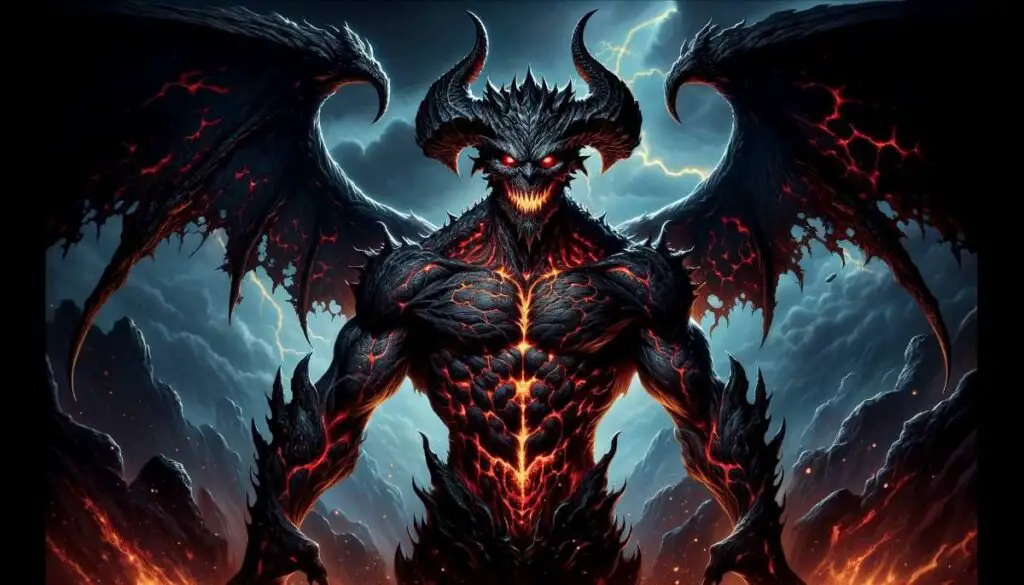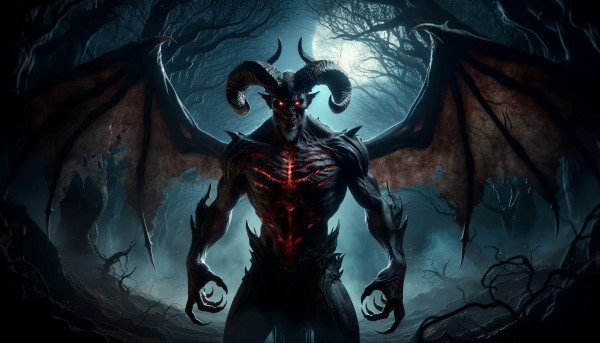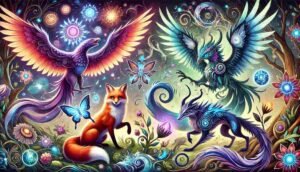The Ultimate Guide to Demon Names: Origins, Meanings, and More

When it comes to demons, their names can be as intriguing as their stories. From ancient myths to modern media, demon names often carry deep meanings and fascinating origins. In this guide, we’ll explore some popular demon names, where they come from, and what they mean. Let’s dive in!
What Are Demon Names?
Demon names are names given to supernatural beings that are often portrayed as malevolent or evil. These names usually don’t follow the typical “first name, last name” structure. Instead, they often reflect the demon’s characteristics or role. For example, names might hint at their powers, appearance, or their role in various myths.
The Origins of Demon Names
Demon names come from a variety of sources:
- Ancient Mythology: Many demon names originate from ancient myths and legends, like those in Greek, Roman, or Norse traditions.
- Religious Texts: Some names come from religious texts, such as the Bible, where demons often have names that reflect their nature or role.
- Modern Media: Movies, TV shows, and video games have also created their own demon names, often for dramatic effect.
Popular Demon Names and Their Meanings
Here are some well-known demon names, their origins, and what they mean:
1. Aamon
- Meaning: Eager
- Origin: Hebrew
- Gender: Male

Aamon is known as a demon who can be fierce and eager. His name reflects his intense and active nature.
2. Baal
- Meaning: Owner
- Origin: Canaanite
- Gender: Neutral
Baal is an ancient name with roots in Canaanite mythology. It reflects power and control.
3. Legion
- Meaning: Army
- Origin: Latin
- Gender: Neutral
In the Bible, the name Legion is used because a group of demons can possess one person, acting like an army of evil spirits.
4. Pandemonica
- Meaning: Chaos
- Origin: Greek
- Gender: Female
Pandemonica’s name comes from the Greek word for chaos, highlighting her role in spreading disorder and confusion.
5. Sauron
- Meaning: Terrible dread
- Origin: Black Tongue (from “The Lord of the Rings”)
- Gender: Male
Sauron is a famous demon from J.R.R. Tolkien’s “The Lord of the Rings.” His name reflects his terrifying and fearsome nature.
500 Demon Names : A Deep Dive into the Dark Side
Here’s a list of 500 demon names from various mythologies, religions, and fictional sources. This includes a mix of traditional names and some inspired by modern media:
- Abaddon
- Aamon
- Abezethibou
- Abigor
- Agaliarept
- Ahriman
- Astaroth
- Asmodeus
- Baal
- Baphomet
- Barbatos
- Buer
- Caim
- Charon
- Dagon
- Decarabia
- Demon Lord
- Dantalion
- Eligos
- Eurynome
- Fenrir
- Forneus
- Furfur
- Gamigin
- Geryon
- Glasya-Labolas
- Gremlins
- Haides
- Hecate
- Iblis
- Ifrit
- Incubus
- Jezebel
- Kobal
- Krampus
- Lamashtu
- Legion
- Lilith
- Malacoda
- Mammon
- Marbas
- Mephisto
- Moloch
- Narakasura
- Nergal
- Nimrod
- Nyarlathotep
- Oni
- Paimon
- Pazuzu
- Plutus
- Puck
- Raijin
- Rakshasa
- Rusalka
- Sauron
- Shaitan
- Shax
- Succubus
- Sytry
- Tartaros
- Tenebris
- Thamuz
- The Beast
- The Dragon
- The Great Beast
- The Pale One
- Thoth
- Tikbalang
- Typhon
- Ubel
- Valefar
- Vapula
- Vassago
- Vetis
- Vritra
- Xaphan
- Yamata-no-Orochi
- Yekun
- Zuggtmoy
- Abigor
- Akuma
- Alastor
- Azazel
- Azmodan
- Balam
- Baphomet
- Bael
- Beelzebub
- Belial
- Berith
- Bethor
- Buer
- Bune
- Camael
- Cimejes
- Clown
- Dagon
- Decarabia
- Demogorgon
- Diabolus
- Domine
- Eligos
- Etrigan
- Famine
- Fenris
- Furcas
- Gacien
- Gaap
- Glasyalabolas
- Golab
- Gorgo
- Hades
- Halphas
- Harbinger
- Iblis
- Ifrit
- Incubus
- Jormungandr
- Juzan
- Kabrakan
- Kage
- Kamad
- Kobal
- Kukulkan
- La Bête
- Legion
- Lilith
- Lix Tetrax
- Mammon
- Malthus
- Malphas
- Marbas
- Melchom
- Mephistopheles
- Moloch
- Murmur
- Naraka
- Nergal
- Nimrod
- Nihil
- Nyx
- Oni
- Orias
- Oriax
- Pazuzu
- Phobos
- Puck
- Purson
- Qayin
- Rakshasa
- Ramiel
- Rize
- Rosier
- Sabr
- Sabnock
- Samael
- Sandman
- Sargatanas
- Satan
- Semyaza
- Seraphim
- Shax
- Sincara
- Sucubus
- Tannin
- Thamuz
- Thoth
- Trym
- Ubel
- Ukobach
- Vapula
- Vepar
- Vetis
- Vritra
- Xaphan
- Yama
- Yekun
- Zuggtmoy
- Asmodeus
- Baalberith
- Balam
- Belphegor
- Beelzebub
- Berith
- Buer
- Caim
- Carabia
- Cloven
- Culebre
- Decarabia
- Eligor
- Envy
- Flauros
- Foras
- Furfur
- Glasyalabolas
- Gorgona
- Hecate
- Ifrit
- Imps
- Incubus
- Jezebel
- Khasmod
- Kobal
- Kokabiel
- LaCroix
- Legion
- Lilith
- Malphas
- Malthus
- Marax
- Marbas
- Mephistopheles
- Merihim
- Moloch
- Naamah
- Naberius
- Nergal
- Nihil
- Nyarlathotep
- Oni
- Oriax
- Paimon
- Pazuzu
- Penemue
- Purson
- Qayin
- Rakshasa
- Raymi
- Roach
- Ronove
- Sabnock
- Samael
- Sariel
- Satan
- Scorpion
- Selene
- Shax
- Sitri
- Succubus
- Sytry
- Tannin
- The Beast
- The Devourer
- Thoth
- Trigon
- Ubel
- Ukobach
- Vapula
- Vepar
- Vetis
- Vritra
- Yama
- Yekun
- Zuggtmoy
- Abigor
- Agaliarept
- Alastor
- Amaymon
- Asmodeus
- Azazel
- Baal
- Baphomet
- Barbatos
- Buer
- Caim
- Charon
- Dagon
- Decarabia
- Dantalion
- Demon Lord
- Etrigan
- Fenrir
- Forneus
- Furfur
- Gamigin
- Geryon
- Glasya-Labolas
- Haides
- Hecate
- Iblis
- Incubus
- Jezebel
- Kobal
- Krampus
- LaCroix
- Legion
- Lilith
- Lamashtu
- Mammon
- Marbas
- Mephisto
- Moloch
- Narakasura
- Nergal
- Nimrod
- Nyarlathotep
- Oni
- Paimon
- Pazuzu
- Plutus
- Puck
- Raijin
- Rakshasa
- Rusalka
- Sauron
- Shaitan
- Shax
- Succubus
- Sytry
- Tartaros
- Tenebris
- Thamuz
- The Beast
- The Dragon
- The Great Beast
- The Pale One
- Thoth
- Tikbalang
- Typhon
- Ubel
- Valefar
- Vapula
- Vassago
- Vetis
- Vritra
- Xaphan
- Yamata-no-Orochi
- Yekun
- Zuggtmoy
- Abigor
- Akuma
- Alastor
- Azazel
- Azmodan
- Balam
- Baphomet
- Bael
- Beelzebub
- Belial
- Berith
- Bethor
- Buer
- Bune
- Camael
- Cimejes
- Clown
- Dagon
- Decarabia
- Demogorgon
- Diabolus
- Domine
- Eligos
- Etrigan
- Famine
- Fenris
- Furcas
- Gacien
- Gaap
- Glasyalabolas
- Golab
- Gorgo
- Hades
- Halphas
- Harbinger
- Iblis
- Ifrit
- Incubus
- Jormungandr
- Juzan
- Kabrakan
- Kage
- Kamad
- Kobal
- Kukulkan
- La Bête
- Legion
- Lilith
- Lix Tetrax
- Mammon
- Malthus
- Malphas
- Marbas
- Melchom
- Mephistopheles
- Moloch
- Murmur
- Naraka
- Nergal
- Nimrod
- Nihil
- Nyx
- Oni
- Orias
- Oriax
- Pazuzu
- Phobos
- Puck
- Purson
- Qayin
- Rakshasa
- Ramiel
- Rize
- Rosier
- Sabr
- Sabnock
- Samael
- Sandman
- Sargatanas
- Satan
- Semyaza
- Seraphim
- Shax
- Sincara
- Sucubus
- Tannin
- Thamuz
- Thoth
- Trym
- Ubel
- Ukobach
- Vapula
- Vepar
- Vetis
- Vritra
- Xaphan
- Yama
- Yekun
- Zuggtmoy
- Asmodeus
- Baalberith
- Balam
- Belphegor
- Beelzebub
- Berith
- Buer
- Caim
- Carabia
- Cloven
- Culebre
- Decarabia
- Eligor
- Envy
- Flauros
- Foras
- Furfur
- Glasyalabolas
- Gorgona
- Hecate
- Ifrit
- Imps
- Incubus
- Jezebel
- Khasmod
- Kobal
- Kokabiel
- LaCroix
- Legion
- Lilith
- Malphas
- Malthus
- Marax
- Marbas
- Mephistopheles
- Merihim
- Moloch
- Naamah
- Naberius
- Nergal
- Nihil
- Nyarlathotep
- Oni
- Oriax
- Paimon
- Pazuzu
- Penemue
- Purson
- Qayin
- Rakshasa
- Raymi
- Roach
- Ronove
- Sabnock
- Samael
- Sariel
- Satan
- Scorpion
- Selene
- Shax
- Sitri
- Succubus
- Sytry
- Tannin
- The Beast
- The Devourer
- Thoth
- Trigon
- Ubel
- Ukobach
FAQs About Demon Names
1. What is the significance of a demon’s name?
A demon’s name often reflects its characteristics, powers, or role in mythology. Names can give clues about what the demon does or what it represents.
2. Where do most demon names come from?
Demon names come from various sources, including ancient myths, religious texts, and modern media. Each source gives a unique flavor to the names.
3. Why do demon names often sound strange?
Demon names can sound unusual because they come from different languages and cultures. They often use ancient or forgotten terms that might seem strange today.
4. Can demon names be used in fiction?
Absolutely! Many writers and creators use demon names in books, movies, and games to add depth and interest to their characters. These names help to create a sense of history and intrigue.
5. How can I come up with my own demon names?
You can create your own demon names by combining elements from different languages, focusing on the traits you want your demon to have. Try using a name generator for inspiration or mix and match parts of existing names.
Conclusion
Demon names are more than just spooky labels; they carry rich meanings and histories from various cultures and traditions. Whether you’re interested in mythology, looking for inspiration for a story, or just curious about the names of these mysterious beings, understanding demon names can add a fascinating layer to your knowledge.
Feel free to experiment with names and see what kind of demon you can create!




No comments yet
Beautiful phone case, you must have it
Your comment is awaiting moderation.Floral Poppy Tough Phone Case for Nature Lovers
Designed by Yuri Khrushch
https://www.amazon.com/Floral-Nature-Lovers-Designed-Khrushch/dp/B0F23G49N7/ref=sr_1_70?dib=eyJ2IjoiMSJ9.Xf5iOyUHsmeP3jHzPCt0Vhw1r97YV3if2mIbQzmBBqHSHqdW7Ew-xEnibR9AUlO-d3TdyZv4n8vatISd0z-akHeuNMuiQuqcilUHXFLIzyPAZNDjXKWUvuO1oGbM9ql_yPsdBwU1OkyCwcojnlwI3WtP2oR6BHaV4S0g9AAOr9w.yz_i1Ao5pH6iqS4vFV-ar2Dv_LS5K0NJDlAAQl_F5Wg&dib_tag=se&keywords=phone&m=A38FMUB1PWNJ6C&qid=1745773517&refresh=1&s=merchant-items&sr=1-70&xpid=c7WLCG0JGMl11